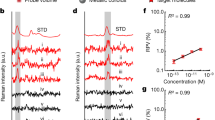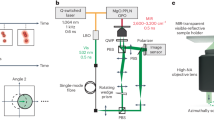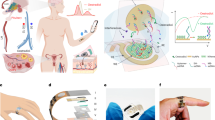Abstract
THE serological behaviour of red blood cells is known to be altered by treatment with dilute solutions of potassium periodate. There is also some evidence that during the interaction of potassium periodate solutions with red blood cells, measurable quantities of periodate ion are consumed1. While investigating the consumption of periodate ions by red blood cells, a method for the determination of relatively small amounts of serine was developed.
This is a preview of subscription content, access via your institution
Access options
Subscribe to this journal
Receive 51 print issues and online access
$199.00 per year
only $3.90 per issue
Buy this article
- Purchase on Springer Link
- Instant access to full article PDF
Prices may be subject to local taxes which are calculated during checkout
Similar content being viewed by others
References
Székács, I., Experientia, 13, 314 (1957).
Malaprade, L., Bull. Soc. chim. France, 43, 683 (1928); 1, 833 (1934).
Nicolet, B., and Shinn, L., J. Amer. Chem. Soc., 61, 1615 (1939).
Boyd, M., and Logan, M., J. Biol. Chem., 146, 273 (1942).
Boyd, M., and Bambach, K., Ind. Eng. Chem., Anal, ed., 15, 314 (1943).
Zuman, P., and Krupička, J., Collection Czech. Chem. Commun., 23, 598 (1958).
Author information
Authors and Affiliations
Rights and permissions
About this article
Cite this article
LADIK, J., SZEKÁCS, I. A Micromethod for the Polarographic Determination of Serine. Nature 184, 188–189 (1959). https://doi.org/10.1038/184188a0
Issue Date:
DOI: https://doi.org/10.1038/184188a0
Comments
By submitting a comment you agree to abide by our Terms and Community Guidelines. If you find something abusive or that does not comply with our terms or guidelines please flag it as inappropriate.



